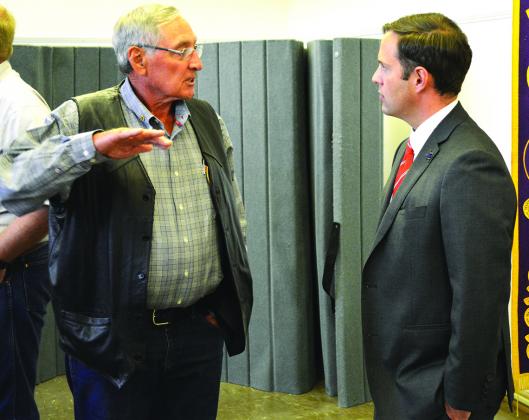Rep. Dustin Burrows, R-Lubbock, spoke about what he hopes to accomplish in terms of improving education and lowering healthcare costs in the upcoming legislative session during a luncheon held by the Rotary, Lions and Kiwanis clubs of Snyder Tuesday.
Burrows said that the session will begin Jan. 10 with a budget shortfall. The legislature will have approximately $4 billion less to budget than previously expected.
Burrows said some of the main issues he and legislators will face in the session will include how to help school districts, especially those in rural areas, maintain the Additional State Aid for Tax Reduction (ASATR) program scheduled to expire before the 2017-18 school year. If the ASATR funding is lost, as scheduled, Snyder ISD could lose $6.5 million and Ira ISD could lose nearly $1 million.
“We’re going to fight to keep this funding and keep school districts running,” Burrows said. “It is good for both rural and urban schools.”
Burrows said he has heard good things about the future of ASATR from other elected officials, including Sen. Charles Perry, and said he expects to see a gradual decrease in ASATR money instead of a total stop.
“My guess is it will be a gradual step-down,” Burrows said.
In other educational matters, Burrows said he will fight the movement to put an end to the “top 10 percent rule,” which ensures any student in the top 10 percent of his or her graduating class is automatically accepted into any public higher education institution in the state.
Burrows also talked about the rising cost of healthcare. The average healthcare premium in the state is set to increase to $17,000, he said.
Burrows explained that while public education has historically been the largest part of the budget, the state is now spending as much, if not more, on healthcare.
“It’s become unaffordable for individuals, for businesses and for the state of Texas,” Burrows said. “We will try to pass legislation that fights insurance inflation. I think the best way to change behavior is to incentivize, not to mandate. You’ll see me propose that.”
Burrows also said that Child Protective Services (CPS) has been facing system-wide challenges, including children who went from foster home to foster home and school district to school district, but were never properly nurtured or treated.
“You had people who, at age 18, were not equipped to function in the real world,” Burrows said. “There were children who went to 12 school districts in a matter of a few years. And if they had behavioral issues, they were just given medication. What I’m hoping for is more CPS workers and more continuity.”
Burrows said he wants to see more effort put toward supporting law enforcement and special education. He said he and other representatives plan to address the issues without raising taxes.
“We’re not going to increase taxes, but we’re going to the meet the challenges of the day,” Burrows said.
Burrows said the Rainy Day Fund has approximately $12 billion, and he said it should be used for a one-time major expense, like disaster relief, and not to fund an ongoing program or expense.
“If you use that money for public education, that’s great for one session, but two sessions later, you’re in trouble,” Burrows said.
Burrows retained his house in the State House of Representatives without opposition.


